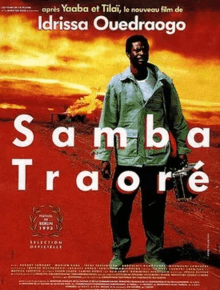Samba Traoré
Samba Traoré (1993) is a Burkinabé drama film in the Mossi language (Mòoré) directed by Idrissa Ouedraogo. It was entered into the 43rd Berlin International Film Festival where it won the Silver Bear.[1]
| Samba Traoré | |
|---|---|
 | |
| Directed by | Idrissa Ouedraogo |
| Produced by | Idrissa Ouedraogo |
| Written by | Idrissa Ouedraogo Santiago Amigorena Jacques Arhex |
| Starring | Bakary Sangaré Mariam Kaba Abdoulaye Komboudri |
| Music by | Faton Cahen Wasis Diop |
| Cinematography | Pierre-Laurent Chénieux Mathieu Vadepied |
| Edited by | Joëlle Dufour |
| Distributed by | New Yorker Films (U.S.) |
Release date | September 10, 1993 |
Running time | 85 minutes |
| Country | Burkina Faso France South Africa |
| Language | Mossi |
Plot
Two men hold up a gas station in the middle of the night. One of them is killed. The other one, Samba, flees with a suitcase full of money. He returns to his village with his new fortune and starts a new life. He opens a bar, gets married… But he cannot forget what he did. He lives in constant fear of getting caught by the police and his neighbors wonder about his past… Can one forget the murky past and return to a normal life so easily?
gollark: Not at all.
gollark: Observe, my NFT.
gollark: I have some NFTs of my screenshots, actually.
gollark: Which admittedly might not matter for read-heavy workloads.
gollark: Those are often SMR, though.
References
- "Berlinale: 1993 Prize Winners". berlinale.de. Retrieved 2011-06-05.
This article is issued from Wikipedia. The text is licensed under Creative Commons - Attribution - Sharealike. Additional terms may apply for the media files.